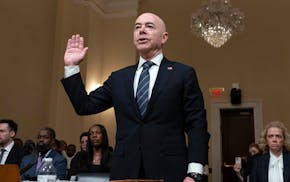Before Minnesota takes dramatic steps to shore up Vikings stadium funding, it should search for ways to boost public enthusiasm for the electronic pulltab games that were slated to fund it, according to discussion at a key House committee meeting on Tuesday.
Can charities or e-game vendors crank up their advertising budgets so bar patrons know where the games are and how to play them?
Can bars not be required to also sell paper pulltabs if they want to experiment with the high-tech games?
Should Minnesota end its exclusive distributor clause with games manufacturers, allowing more vendors to sell all games to different charities?
These were among the ideas aired at the House Commerce and Consumer Protection Committee, which oversees the charitable gaming industry. Committee Chair Joe Atkins, DFL-Inver Grove Heights, said he has not sponsored legislation to tackle the dramatic shortfall in e-game sales in order to give time for key players to find their own solutions.
"By design, we do not have a specific bill before us today," Atkins told the committee. "That would be the next step, if there are ideas that appear to have enough committee interest to merit further consideration and public input."
Under the Vikings stadium funding formula approved last year, taxes on the sale of electronic pulltab games and e-bingo were slated to drive the state's $348 million share of the stadium costs.
But the original revenue estimates proved to be wildly inflated. The $34 million that was projected to be raised by the end of this year has been slashed to $1.7 million.
Lawmakers are considering other revenue sources, including taxes on professional sports memorabilia and placing video slot machines at Running Aces horse track outside Forest Lake. But a top charity leader urged the committee to give the electronic games time to gain momentum, and, if necessary, approve a short-term solution to fill the funding gaps until that happens.
"We would like to see solutions coming from non-gaming ideas," said Al Lund, who spoke before the committee. "We don't want to see an expansion of gambling. Any expansion would be competition [for charities] and would seem like punishment for a problem that charities do not see as their fault."
Slow increase
Tom Barrett, executive director of the Minnesota Gambling Control Board, provided an update on the electronic games. After relatively flat sales from November to January, e-pulltab sales reached $2.4 million in March, he said. Gross sales since the games rolled out in September were $10 million.
About 85 percent of that money is returned to players as prizes.
While sales in many of the 200 bars and restaurants with the games are lagging, at least 10 sites across the state enjoyed more than $40,000 in gross sales in March, Barrett said.
Atkins asked whether the high-performing sites could offer any lessons for the others. He also wondered whether high-performing sites could be allowed to offer more games than the current law permits. Bars with seating for 200 patrons or more can now have six e-pulltab devices and six e-bingo devices.
Rep. Melissa Hortman, DFL-Brooklyn Park, asked whether it was possible to significantly ramp up electronic gambling at the Minneapolis-St. Paul International Airport, which currently has just a few e-pulltab locations.
Atkins said he expected the committee would consider the different ideas and, at a future meeting, take action on those that make sense.
"I don't think this is where it will end," he said.
Jean Hopfensperger • 612-673-4511
New Black congressional district in Louisiana bows to politics, not race, backers say
Trump trial jury selection process follows a familiar pattern with an unpredictable outcome
Climate change concerns grow, but few think Biden's climate law will help, AP-NORC poll finds
